Homestead Read online
Page 5
Just as she was making a mental note to have Ella set up a town meeting once she had a sense of where most of the community was going to fall out, Ella walked in. All conversation stopped. Clay might have gotten a few curious looks, but Ella, even in casual clothes—which for her meant tailored black pants, a form-fitting white tee, and a light blazer to cover her weapon—drew outright stares. She strode over to Clay as if oblivious to the attention, but Clay knew she could recite exactly where everyone was seated and what they looked like.
“Morning,” Clay said.
“Couldn’t sleep?” Ella nodded to the counter girl who set down a full mug of coffee by her right hand. “Thanks.”
“Just can’t wait to get started,” Clay said.
Ella laughed. “I’ll bet. I’m guessing we’ll need a town meeting before this is done.”
“You guessed right.” Clay thought of the conversations she’d just heard, thought of Tess’s automatic distrust of her and the company. She really needed to talk to the farmers, including Tess.
That idea was the best thing about the morning so far.
*
Tess walked her best milker into the milking stall and tethered her with a loose lead rope to the ring mounted on the wall. After dipping each udder into a container of Betadine, she attached the suction tubes to each one and started the automatic milking machine. Immediately, thick white fluid streamed into the collection tubes. Tess ran her hand down the cow’s flank as the milk ran into the sterile lines that carried the milk to the storage tanks. On a good day, this cow—Buttercup—would give her over a hundred gallons of milk. And Buttercup’d eat the same amount of food—at least a hundred pounds of corn, hay, and grain—and drink fifty gallons of water. Multiplied by eighty, the herd consumed an incredible amount of feed. She relied on her fields for the corn and alfalfa to sustain her herd, and if she didn’t get it this year, she’d be dipping into her bank account to supplement before long.
The door at the far end of the barn creaked open, letting in a shaft of early-morning sun, and her foreman, Tomas, a suntanned fifty-year-old whose hair was still as coal black as it had been when he was twenty, strode toward her. Tomas had been on the farm as long as she could remember, starting as a young man working the fields. He’d grown with the needs of the business, taking courses in animal husbandry at night at the community college where Tess had eventually gotten her degree. He’d never wanted to leave and buy his own farm, saying he could never find a place as beautiful to work or people as friendly to work with.
“How are things looking?” Tess asked.
Without Tomas, Tess doubted she’d be able to handle everything that needed to be done on the farm. Even with plenty of help, farming was a seventeen-hour-a-day job. Most dairy farms in the country were family-owned businesses because it took a family of one kind or another to run a farm—tending the cows, rotating them out to feeding stations or the fields and into the barn for milking twice a day, ensuring they had the right feed mixture and timely veterinary care and a clean, healthy living environment. Add to that the stress of calving, feeding and caring for the young, not to mention documenting their entire lives from birth until they were culled from the herd or died from other causes. The state regulated everything about dairy farming from the health of the herd to the soil composition to how the milk was stored and transported. When she wasn’t directly overseeing the milking, the care of the stock, or the state of the fields, she was doing paperwork. When she returned to the house at night she always had one form or another to complete or update. On most farms, the extended family—spouses, children, multiple generations of family members—divided up the chores. With her mother gone and now her stepfather, Tomas was a critical member of her farm family.
“The yield is down a little,” Tomas said. “The heat.”
“I was afraid of that.” Tess sighed, took the clipboard he handed her, and ran her eye down the totals for the morning milking. Off about 10 percent. “How’s the silage holding up? I think we might be able to get another cutting from the back fields next week, but it won’t be ready for feed for a while.”
“We’ll be all right for a bit.” He slipped a stick of spearmint gum from the ever-present pack he carried in his front pocket and offered her one.
“Thanks, no,” Tess said as she always did. She’d given up telling him she detested spearmint gum when she was ten.
“Calves are all looking good. Growing fine. Vet’s due tomorrow,” Tomas said as he folded a piece into his mouth.
“Right.” Tomorrow was Saturday already. Ordinarily she never forgot appointments, but she’d been a little distracted, what with the news about the drilling…and Clay. Tess grimaced, shook her head. “Eight o’clock, right?”
“Yep. I can take care of it if you want.”
“Thanks, but I’ll need to be there.” Tess switched off the milking machine as the amount coming down from the near-flaccid milk bag slowed to a trickle, removed the suction tubes from the udders, and wiped them down again with Betadine. “You’ll have enough to do with the milking. Transport will be coming around right about then too.”
“Okay. I was thinking to have Jimmy move some of the chop over for the heifers—the pasture’s looking a little thin.”
“Good, thanks. I have to be out this afternoon. Call me if anything comes up.”
“Will do.” Tomas released the ties on the cow to take her back to her stall. “You plan on being at the town meeting tomorrow night?”
“That’s tomorrow too?” Tess rubbed her eyes, nodded. She tried to make the town meetings whenever she could, but this was one she couldn’t afford to miss. The issue of drilling would undoubtedly be on the agenda. “I’ll be there.”
Satisfied that everything was under control for the moment, Tess started back for the house and her second cup of coffee. A black pickup truck turned into the drive just as she reached her porch. She stopped and waited, recognizing the driver as he drew near. Pete Townsend owned a big farm south of hers. Whenever she ran into him at Grange meetings, he was always friendly, but she wouldn’t say she knew him well. She had a feeling she knew what this visit was about, though.
“Hi, Pete,” she called as he stepped out of his truck. He was a big clean-shaven man, still fit with just a bit of softness around the middle. As usual, he wore a khaki work shirt, pants, and heavy boots, his close-cropped salt-and-pepper hair covered by a black Yankees cap.
“Tess,” he said, walking up the stone path toward her. “Got a minute? Sorry to drop in so early. You’ve probably got milking—”
“No problem. Milking’s done.” Tess came down the stairs, trying not to let her annoyance show at his veiled suggestion that she wouldn’t have the morning’s work well in hand by seven a.m. “Come on in. I was just about to have another cup of coffee myself. I’ve got some blueberry muffins from Caroline’s. If you’re of a mind.”
“I’m always of a mind,” he said, ruefully patting his stomach as she led him around the back to the kitchen.
She brought coffee, plates, and butter and set the muffins in front of him. She sipped her coffee and waited while Pete broke a muffin in half and generously buttered it. “I suppose you’re here about the drilling.”
He took a bite, chewed, sipped his coffee, and swallowed. “I am. Things are moving pretty fast, faster than we expected, and I don’t think we’re ready for this slick outfit they sent in here. They’ve already got trailers and people up to the Hansen place and big machinery coming in every hour. If we don’t do something, they’ll be drilling by the end of next week.”
“It seems to me that horse has already left the barn,” Tess said. “Hansen and quite a few others signed over their gas rights years ago, didn’t they? And now the state seems pretty determined that the drilling goes on.”
“All that’s true, but other townships have been able to block the drilling, and we might be able to slow them for a while—make them prove they’re not going to compromise our farms.”
/>
Tess agreed with him, which was exactly the reason she planned on talking to Leslie that afternoon, but that was her business. “I don’t imagine that will be easy.”
“It might be if we all stand together. You’re closer to Hansen’s place than I am, you’ve got to be worried.” Pete paused with the last remnants of muffin in his hand. “I know Ray was talking to them back a ways.”
A cold hand skimmed down Tess’s spine. She hadn’t known that. And she wasn’t about to confess that to Pete. “Anything that affects my farm concerns me.”
“I’m hearing they’re sending in some kind of big shot to run this project—like we’ll be impressed or too intimidated to stand up to him.”
The big shot was Clay. Tess thought about what Clay had said the night before, that she would be speaking to the farmers about the drilling and how it might affect them. She’d have a tough sell with Pete and his ilk, but that wasn’t Tess’s worry. She didn’t want secondhand information from anyone, including Clay. “Well, I’m certainly interested in the facts, and you can be sure I’m going to be looking out for the interests of my land and my animals.”
He studied her silently and she held his gaze. If he was taking her measure, she didn’t mind. She was used to it.
“I know quite a few people have talked to you already about selling,” Pete said casually. “And I understand this is your family home. But you’ve got five hundred acres of land that needs tending. That’s a lot of work for one wo—person. Might be we could strike a deal where you can keep the house and a little bit of land, sell me the fields and the stock—”
“No,” Tess said, keeping her tone friendly. “I’m not interested in selling. You might pass that word along because the message just doesn’t seem to be sticking.”
He smiled. “Thought I’d give it a try.” He stood, picked up the cap he’d set on the table. “I’m hoping you’ll see things my way, Tess. The more people that oppose the fuel company, the better chance we’ll have at keeping them out. And believe me, that’s what we want to do.”
“Thanks for stopping by, Pete.”
Tess walked him to the door and watched him drive away. She wasn’t surprised he’d made an offer for her farm and briefly wondered what else motivated his opposition to the drilling. Pete struck her as the kind of man who always had a contingency plan. Clay would handle him, although Tess didn’t know why she believed that. She knew nothing of the woman Clay had become. And she didn’t want to.
She really didn’t want to think about Clay at all, even though she’d done almost nothing except exactly that since Clay had appeared out of nowhere, as if she’d never been gone.
Chapter Six
Clay held the door for Ella as they left the diner.
“You really should let me know when you’re going out,” Ella said.
“I hardly think I need protection around here.” Clay gestured to the mostly empty streets on the short walk back to the small lot behind the B&B where Ella had parked the SUV.
“I know you can take care of yourself, but you underestimate your own importance. And if you’re not worried about yourself, just consider what happened to Doug in London last year.”
“I know, I know,” Clay said. Doug Hedley, NorthAm’s UK division head, had been mugged and his briefcase stolen along with some important merger papers. The theft had seriously compromised the final deal. They’d never been able to determine if the attack was specifically targeted or random, but industrial espionage and blatant strong-arm tactics were becoming commonplace in the highly competitive world of international fuel acquisition. Add to that her father’s high profile and substantial wealth, and Clay was a potential target for kidnapping or attack. She didn’t like the lack of privacy that went along with personal security, but she wasn’t consciously trying to make Ella’s job harder. “I was going to call you at a decent hour.”
“I was awake.” Ella unlocked the SUV with the remote.
“Well, you obviously knew where I was.”
“Knowing where you are isn’t good enough. I need to be with you.” Ella paused, regarded the Harley next to the SUV, then eyed Clay. “Is that by any chance—”
Clay gave her the smile that usually got her one in return—with most women. “Guilty.”
Ella shook her head. “Just be careful—and stay in touch with me. The diner felt decidedly cool this morning.”
Clay sighed. “I have some work to do.”
“Well, you’ve had practice. You’re good at putting things into perspective for people.”
“Thanks.”
“I still want you to keep a low profile for a while.”
“I’ll try to behave,” Clay said.
Ella nodded, looking skeptical. “That should be interesting.”
Laughing, Clay settled into the passenger seat and opened the briefcase Ella had brought along, content to let Ella drive. Ella was a good driver and Clay needed the time to review the specs on the job. When her cell phone rang, she checked the readout and answered. “Hello, Dad.”
“How’s the weather?” Her father’s deep baritone resonated even with a sketchy connection. He’d always been able to command a room with just a look and a word.
“Hot.”
“So I hear.” He said something in a low murmur to someone else and then came back briskly. “You’ve got some loose ends up there that need immediate attention. Millie will email you with the details on the acquisitions still in the works. You’ll want to sew those up as quickly as you can.”
“What do you mean, acquisitions? I thought Ali had that all taken care of.”
“We didn’t expect to green-light this project so quickly, and Ali hadn’t pressed to close the deals. We need to have unrestricted access to all drill sites to determine the optimal locations. Let’s move this along before someone in the legislature changes his mind again. Once we’re drilling, forward momentum will make it impossible to stop us.”
“What kind of budget—”
“Whatever you need. Take a look at what we negotiated originally and work from there. You ought to be able to handle negotiations with a bunch of farmers.”
Clay bit back a retort. Arguing with her father had always been an exercise in futility. Thinking of Tess’s opposition and the resistance she’d heard that morning, she suggested, “Maybe we should back off a bit and do a little more advance work. There’s a fair amount of opposition—”
“And that’s exactly why we need to move faster. We’ve got a toehold—now I need you to expand it. I’m confident you will.”
“Right. I’ll look over Ali’s paperwork as soon as I can. Then I’ll set up meetings with the landowners.”
“I trust you won’t complicate issues with old history.”
Clay squeezed the phone hard enough to make her knuckles ache. “The past has nothing to do with what’s going on here now.”
“Good. I’m glad to hear that. I’ll expect a report tomorrow.”
“All right, I’ll do what I ca—”
“And don’t forget Annabelle’s birthday celebration. You’re expected.”
“On my calendar.” Clay’s stepmother number two was a younger version of stepmother number one and, while pleasant enough, was essentially a stranger. “Wouldn’t miss it.” She disconnected and slid the phone into the front pocket of her pants. She looked out the window, the blaze of her temper blocking out the scenery.
“Problem?” Ella asked quietly.
“Nothing more than usual.” Clay clenched her fist on her knee. Her father still assumed he could direct her private life as well as her professional one, maybe because she let him.
“Can I help?”
“No,” Clay said softly. “This one’s on me.”
*
Tess reached Albany with ten minutes to spare and parked on Lark Street around the corner from the address Leslie had given her. Climbing the wide stone stairs to the three-story brownstone, she was reminded of how it felt being the girl who came
to work at the resort rather than one of the girls spending the summer there vacationing. But Leslie hadn’t really been one of those privileged girls, either. She’d been the daughter of the resort owner, and there had been plenty of days when she and Tess had worked side by side when things got busy. By the time Tess pressed the brass doorbell next to the wide walnut doors, she’d forgotten past insecurities. She wasn’t that girl anymore and hadn’t been for a long time.
A female voice came over the intercom. “Yes?”
“Hi, I have an appointment with Leslie Harris today.” Tess automatically glanced up at the camera tucked into the corner of the alcove and smiled.
“Of course. Come right in.”
The lock buzzed, and the ornate brass doorknob turned in her hand. The foyer was as elegant as some living rooms she’d been in—old slate squares on the floor, dark walnut wainscoting, and above that, wallpaper in a muted floral print Tess guessed was original. She followed the winding mahogany staircase upward to the second floor where a discreet plaque announced Leslie Harris Attorney-at-Law. She entered a waiting room with a thick Oriental carpet and dark wood trim where a woman in a pale-green linen dress that complemented her auburn hair and moss-green eyes sat behind an old-fashioned cherry desk.
“Tess?” the woman said.
“Yes.”
“Estelle Clinton, Leslie’s paralegal. She’s just finishing up a phone conference and will be with you in a minute.”
“Thanks.”
“Do you need anything while you’re waiting? Sparkling water? Coffee? Tea?”

 Secrets of the Heart
Secrets of the Heart Clinical Trials
Clinical Trials Blessed Benediction
Blessed Benediction Happy, Happy Birthday, Baby
Happy, Happy Birthday, Baby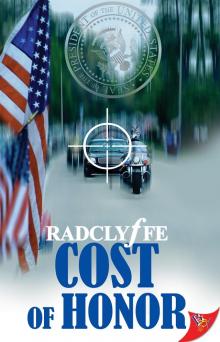 Cost of Honor
Cost of Honor Love on the Night Shift
Love on the Night Shift Top of the Class & Bonus Night
Top of the Class & Bonus Night You Don’t Bring Me Flowers
You Don’t Bring Me Flowers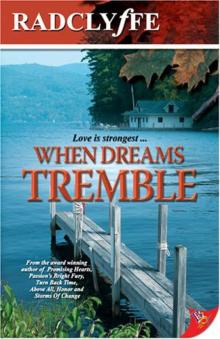 When Dreams Tremble
When Dreams Tremble Firestorm
Firestorm The Color of Love
The Color of Love Women of the Dark Streets
Women of the Dark Streets Radclyffe - (Honor 4) - Honor Guards
Radclyffe - (Honor 4) - Honor Guards Honor 03 - Love And Honor
Honor 03 - Love And Honor Love's Masquerade
Love's Masquerade Love After Hours
Love After Hours OMGQueer
OMGQueer A Matter of Trust
A Matter of Trust Honor Under Siege
Honor Under Siege Best Lesbian Romance 2009
Best Lesbian Romance 2009 Honor 06 - Honor Under Siege
Honor 06 - Honor Under Siege Best Lesbian Romance 2012
Best Lesbian Romance 2012 Breathless
Breathless Nick of Time
Nick of Time The Lonely Hearts Club
The Lonely Hearts Club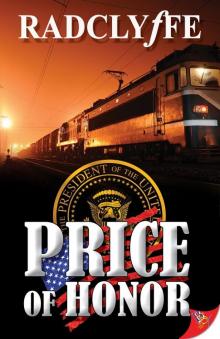 Price of Honor
Price of Honor Word of Honor fr-7
Word of Honor fr-7 Winds of Fortune (Provincetown Tales Book 5)
Winds of Fortune (Provincetown Tales Book 5) Above All, Honor
Above All, Honor Radclyffe - Honor 06 - Honor Under Siege
Radclyffe - Honor 06 - Honor Under Siege Distant Shores, Silent Thunder
Distant Shores, Silent Thunder Word of Honor
Word of Honor Word Play
Word Play Fated Love
Fated Love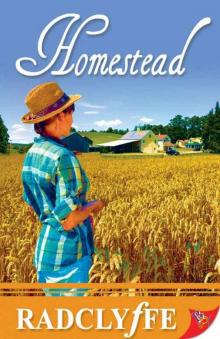 Homestead
Homestead Radical Encounters
Radical Encounters Heart Stop
Heart Stop Code of Honor
Code of Honor Myth and Magic
Myth and Magic Wild Shores
Wild Shores Oath of Honor
Oath of Honor Desire by Starlight
Desire by Starlight Love Burns Bright
Love Burns Bright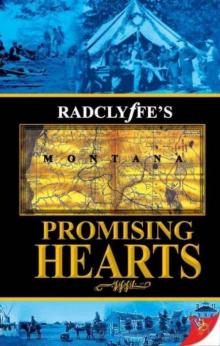 Promising Hearts
Promising Hearts Helplessly Hers
Helplessly Hers Love & Honor h-3
Love & Honor h-3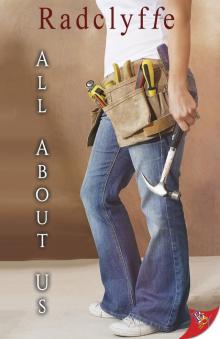 All About Us
All About Us Honor 01 - Above All Honor
Honor 01 - Above All Honor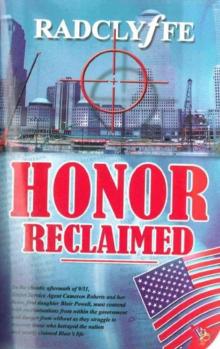 Honor 05 - Honor Reclaimed
Honor 05 - Honor Reclaimed Innocent Hearts
Innocent Hearts Taking Fire
Taking Fire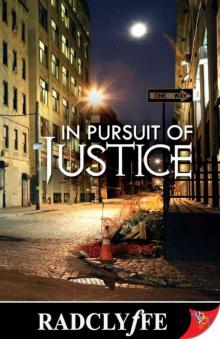 In Pursuit of Justice
In Pursuit of Justice Love's Melody Lost
Love's Melody Lost Passion's Bright Fury
Passion's Bright Fury Returning Tides
Returning Tides Change of Pace
Change of Pace Safe Harbor
Safe Harbor Night Call
Night Call Honor 04 - Honor Guards
Honor 04 - Honor Guards Honor Bound
Honor Bound Cruising the Strip
Cruising the Strip Above All, Honor h-1
Above All, Honor h-1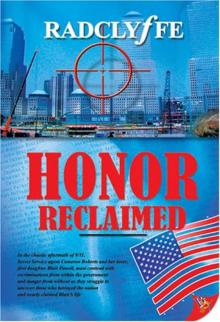 Honor Reclaimed
Honor Reclaimed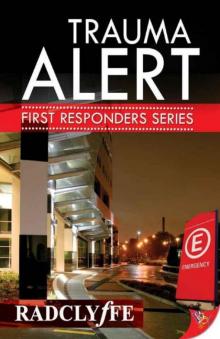 Trauma Alert
Trauma Alert Love On Call
Love On Call Best Lesbian Romance 2014
Best Lesbian Romance 2014 Discovery
Discovery shadowland
shadowland Justice for All
Justice for All Best Lesbian Romance 2011
Best Lesbian Romance 2011 Turn Back Time
Turn Back Time Winds of Fortune
Winds of Fortune Honor Guards
Honor Guards Justice in the Shadows
Justice in the Shadows Love's Tender Warriors
Love's Tender Warriors Dangerous Waters
Dangerous Waters First Sight
First Sight By the Light of the Moon
By the Light of the Moon Honor 07 - Word Of Honor
Honor 07 - Word Of Honor Tomorrow's Promise
Tomorrow's Promise Amor and More
Amor and More Best Lesbian Romance 2010
Best Lesbian Romance 2010 Sheltering Dunes (Provincetown Tales Book 7)
Sheltering Dunes (Provincetown Tales Book 7) Love And Honor
Love And Honor Secret Hearts
Secret Hearts Prescription for Love
Prescription for Love Passionate Rivals
Passionate Rivals Against Doctor's Orders
Against Doctor's Orders Radclyffe - Honor 01 - Above All, Honor
Radclyffe - Honor 01 - Above All, Honor Honor 02 - Honor Bound
Honor 02 - Honor Bound Beyond the Breakwater
Beyond the Breakwater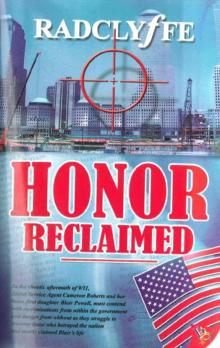 Radclyffe - (Honor 5) - Honor Reclaimed
Radclyffe - (Honor 5) - Honor Reclaimed Storms of Change
Storms of Change Honor Bound h-2
Honor Bound h-2 Justice Served
Justice Served Sheltering Dunes
Sheltering Dunes Best Lesbian Romance of the Year
Best Lesbian Romance of the Year Secrets in the Stone
Secrets in the Stone